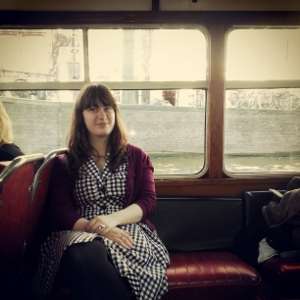Southbank Centre’s The Rest is Noise festival is continuing this season with programming focusing on the second half of the 20th century. Tonight’s music was a part of the festival’s Britten centenary celebrations, adding in works by Copland and Shostakovich. Joining the City of London Sinfonia and conductor/clarinettist Michael Collins were an array of soloists who delivered convincing performances of works by these composers, programmed under the theme of “Music From Across the Iron Curtain”.
Britten’s Serenade for tenor, horn and strings is in some ways a strange piece: there are not many works for this sort of ensemble with solo horn. One can understand why – it is very difficult to get the balance of sounds right, as the horn can so easily overpower the other instruments on stage. It was clear that all musicians at the Queen Elizabeth Hall knew this, and as a result the sound was almost perfectly balanced. This was particularly the case in what is arguably the work’s most exciting and beautiful movement: “Dirge”. Tenor Ronan Busfield was on excellent form throughout the Serenade, but in “Dirge” his performance really took off and when Stephen Stirling’s horn joined in the result was fantastic.
Next up were two pieces for clarinet and orchestra: the second movement from what would have been Britten’s clarinet concerto (realised by Colin Matthews and arranged by Joseph Phibbs), and the famous concerto by Aaron Copland. The Britten work was short and sweet, with some absolutely beautiful melodies for the clarinet. Even though it would have been a slow movement in the concerto, the piece was energetic and diverse, with multiple rhythmic changes that made it rather difficult for Michael Collins to juggle both the clarinet and the baton. He did an excellent job, however, playing beautifully while keeping on top of the orchestra. But at the end of the performance I could not help but think about how much this movement added. I certainly would not rank it amongst the best orchestral pieces I have heard by Britten, and perhaps it will only be important as a historical artefact, and not for its musical value.
At the other end of the spectrum, we have Copland’s Clarinet Concerto, one of the more famous pieces written for the instrument, and rightly so. Collins spoke briefly before starting the piece and lauded the first movement’s “idyllic” nature, as well as the virtuosity in the cadenza and the liveliness of the third movement. It was indeed the third movement that completely stole the show, with many members of the orchestra and audience unashamedly bopping along with their feet.
After this show-stopping ending to the first half, we were treated to a much bleaker, yet equally exhilarating piece. Shostakovich’s Symphony no. 14 is as much a song cycle as it is a symphony, and it is set to poems about death by Lorca, Apollinaire, Küchelbecker and Rilke. It’s written for a much smaller ensemble than most of his other symphonies, but the addition of soprano and bass still make it an extremely powerful work, relying as much on the beauty of the text as on the beauty of the music.
Soprano Evelina Dobraceva was the star of the evening, singing every note with great conviction and emotion, her beautiful voice ringing out through the hall. Graeme Broadbent seemed to struggle more with the material, and at times it seemed that he was not comfortable with the Russian. His voice was powerful and had a wonderful timbre, but Dobraceva completely stole the show. The performance of “Le Suicidé” was one of the most beautiful moments I have been witness to in a concert hall for a very long time, and I doubt that I was the only one holding back tears. Dobraceva’s phrasing of “Tri lilii” was so subtle yet so perfect, the returning phrase both calming and heartbreaking.
Shostakovich’s music is often full of light and darkness, and even though this symphony has its uplifting moments with small glimmers of hope, these are few and far between. There is mainly darkness and desolation, both in the lyrics and in the music. As Shostakovich himself recounted in Testimony: “they wanted the finale to be comforting, to say that death is only the beginning. But it’s not a beginning, it’s the real end, there will nothing afterwards, nothing.” Thankfully for us, the beauty of the music and the performance meant that there was massive applause, providing that hope and optimism that the piece itself only hinted at.


